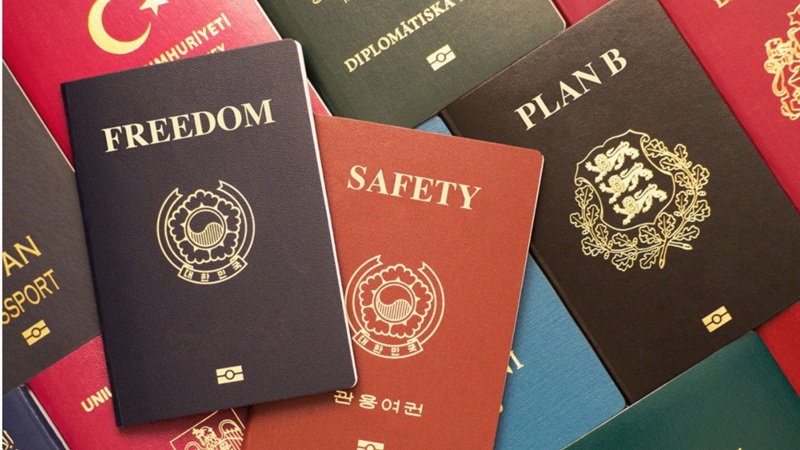In today’s interconnected world, global travel is more accessible than ever. However, with increasing geopolitical instability, economic uncertainty, and the lingering effects of the COVID-19 pandemic, traveling abroad is not without its risks. For individuals seeking safety, flexibility, and security, a second passport has become a powerful tool. By offering increased mobility, access to better healthcare, and financial safety nets, a second passport can act as a key to safer global travel.
What is a Second Passport and How Does it Work?
A second passport is issued to individuals who have obtained dual citizenship in another country. This additional citizenship can be acquired through various means, including:
- Ancestry or descent: If your parents or grandparents were citizens of a particular country.
- Naturalization: Living and meeting residency requirements in a foreign country.
- Citizenship by investment: Investing in a country’s economy in exchange for legal citizenship.
Holding a second passport grants you the same rights and privileges as native citizens of the issuing country, including freedom of movement, access to services, and protection during international crises.
The Connection Between Safety and Travel Freedom
When global emergencies arise, whether due to political unrest or natural disasters, having a second passport can be the difference between being stranded and reaching safety. Dual citizenship allows individuals to enjoy visa-free or expedited travel to a wider range of countries. For instance:
- European Union (EU) passports grant access to all member states and several non-EU countries.
- Caribbean nations, such as Saint Kitts and Nevis, offer visa-free travel to over 140 countries, including the UK and Schengen Zone nations.
- Citizens of countries with strong international relations often face fewer travel restrictions during global emergencies.
In addition, second passports often allow their holders to bypass bureaucratic delays or restrictions imposed on single-citizenship travelers.
Political Instability and the Role of Dual Citizenship
The benefits of dual citizenship are especially evident during times of political instability. History is filled with examples of individuals fleeing conflict zones and finding refuge in countries where they hold second citizenship.
For example:
- During the Arab Spring, individuals with a second passport could leave the affected regions quickly, avoiding long delays and bureaucratic hurdles.
- Amid the recent Russo-Ukrainian conflict, citizens with dual nationality found it easier to relocate and access consular support from their secondary countries.
Countries such as Canada and Portugal are popular choices for those seeking citizenship by investment, while Malta citizenship by investment stands out for its political stability and strong international relations.
Economic Crises and Second Passports as Financial Safety Nets
Economic volatility can severely impact an individual’s safety and financial security. A second passport provides an economic lifeline by enabling access to stable banking systems, investment opportunities, and diversified assets.
Here’s how second passports can act as financial safety nets:
- Banking Access: Many individuals secure second citizenship in countries with robust financial institutions to protect their assets.
- Tax Benefits: Some countries offering citizenship by investment programs, such as the Cayman Islands or Monaco, have tax-friendly policies.
- Economic Mobility: With a second passport, individuals can seek employment or start businesses in their secondary countries.
By diversifying their citizenship portfolio, individuals can mitigate risks associated with economic downturns in their primary country.
Health and Pandemic Safety: Lessons from Recent Crises
The COVID-19 pandemic revealed the fragility of global mobility and the importance of having alternatives. During the height of the pandemic, citizens of countries with robust healthcare systems and strong travel agreements faced fewer challenges.
Advantages of dual citizenship during health crises include:
- Healthcare Access: Many countries prioritize their citizens for medical care and vaccinations during emergencies.
- Travel Flexibility: Second passports allowed individuals to navigate travel bans or access countries with strict entry requirements.
- Evacuation Opportunities: Citizens with multiple passports had more options to evacuate high-risk zones.
Countries offering citizenship by investment often promote the quality of their healthcare systems as a key benefit, appealing to those seeking better health security.
Eligibility and Accessibility: Who Can Benefit?
While the idea of holding a second passport is appealing, not everyone is eligible. Common pathways to second citizenship include:
- By Investment: Popular in countries like Malta, Antigua and Barbuda, and Saint Lucia, these programs require individuals to invest in the country’s economy, typically through real estate or government bonds.
- By Descent: Individuals with ancestral ties to certain countries, such as Ireland or Italy, may qualify for citizenship.
- By Residency: Living in a foreign country for a specific period may allow for naturalization.
These programs cater to diverse needs:
- High-net-worth individuals: Often pursue citizenship by investment for enhanced global mobility and tax optimization.
- Families: Seek safe and stable countries for education and healthcare.
- Expats: Use dual citizenship to gain legal rights in their chosen country of residence.
Limitations and Ethical Considerations
While a second passport offers numerous benefits, it’s important to consider the challenges and ethical issues associated with obtaining one:
- Cost: Citizenship by investment programs can be prohibitively expensive, often requiring investments of $100,000 or more.
- Dual Loyalty: Some countries may question the loyalty of individuals holding dual citizenship.
- Ethical Concerns: Critics argue that citizenship should not be commodified, as it can create inequities and exclude those unable to afford it.
Additionally, not all countries permit dual citizenship, and individuals must navigate complex legal frameworks to ensure compliance with both countries’ laws.
Conclusion
For many, a second passport is more than just a travel document—it’s a safeguard for their future. From facilitating evacuation during crises to offering financial security and better healthcare, dual citizenship provides unparalleled advantages in an unpredictable world.
However, it’s essential to weigh the benefits against the costs and legal complexities. Whether acquired through citizenship by investment, ancestry, or residency, a second passport is a powerful tool for those seeking to enhance their safety and freedom. For global travelers, it may indeed be the key to navigating the uncertainties of modern life with confidence.



















Leave a Reply